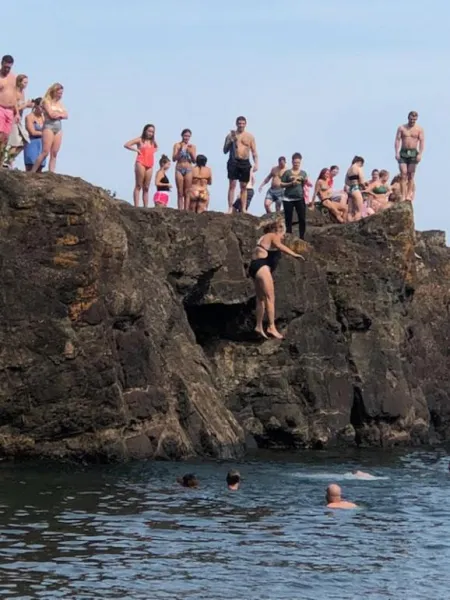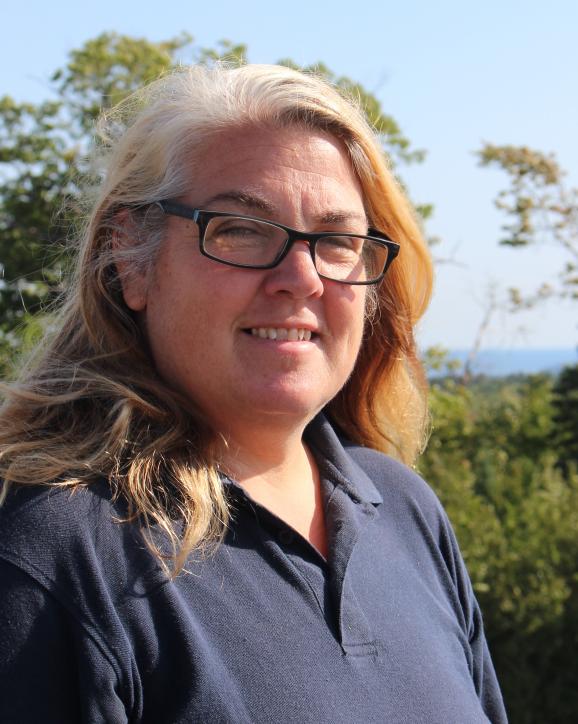“Reach or throw; don’t go.” NMU alumna and former Wildcat swimmer Shawn Robinson-Sobczak (’98 BS) routinely recites that phrase when she leads swim lessons or serves as a lifeguard instructor. When someone is in distress and it’s not possible to extend a hand to pull the swimmer to safety or throw something that floats, bystanders should not risk their own lives by entering the water. But Robinson-Sobczak has also been a certified lifeguard for 34 years. So when an NMU student took too long to surface after jumping off Black Rocks and a friend struggled to assist him, her rescue instinct took over and she leaped in to help.
“When he came up, I could tell he was panicked,” she said. “Other people didn’t realize he was in trouble. He didn’t yell for help because he was too busy struggling to get air in. Even when he grabbed on to his friend, others thought he was kidding around, but the friend’s face made it clear he wasn’t. I was able to get behind him and grab his armpits so he wouldn’t push me down. He listened quickly when I told him to relax, which is the biggest thing you need someone to do, and we made it to the base of the rocks.”
Robinson-Sobczak talked to the young man in the somber moment afterward, as his group prepared to leave. She discovered that he was from Detroit, had never learned how to swim and had never even waded in Lake Superior before.
“I told him it’s never too late to take swim lessons,” she said. “I think he may have been trying to impress the people he was with. They were egging him on a little, telling him it wasn’t that bad and that they’d be at the bottom to help. Giving in to peer pressure and going against your better judgment is never good, especially with this. Superior is not a regular lake and you need to respect it. The rip currents and water temperature can test even the strongest swimmers. The water temp that day was 47 degrees.”
Recognizing that NMU students have many opportunities to interact with Lake Superior, the university is firmly committed to awareness efforts. Lake Superior safety—primarily related to rip currents—has been addressed at new student orientation, Fall Fest, in print and online resources, and through programming. NMU also sponsors a rescue station at Picnic Rocks, with others installed in Marquette and at Little Presque.
Jumping from Black Rocks is a rite of passage for many NMU students, as well as community members and adventurous visitors. The crowd that had assembled on Labor Day included Robinson-Sobczak and her daughter, Grace. Each had leaped off the ledge before on separate occasions, but Grace wanted them to do it together for the first time. They hadn’t yet fulfilled her wish when Robinson-Sobczak was thrust into rescue mode.
Despite a successful outcome, the lifeguard instructor cannot help but critique her response: “On my way down, I yelled for someone to call for help. What they teach in class is that you should be specific, like ‘You in the blue shirt, call 9-1-1.’ Some of my past lifeguard students also pointed out that I went in with no equipment. There’s no rescue station on Black Rocks because waves would wash it away, but ideally the first choice would be to extend a tree branch or throw a cooler or anything inflatable, if possible.”
Robinson-Sobczak said she has saved others before, but never in water over her head. In a Facebook post that began, “So this happened today,” she turned what could have been a simple summary of a near-tragic situation into an educational opportunity in the hope of making a difference.


